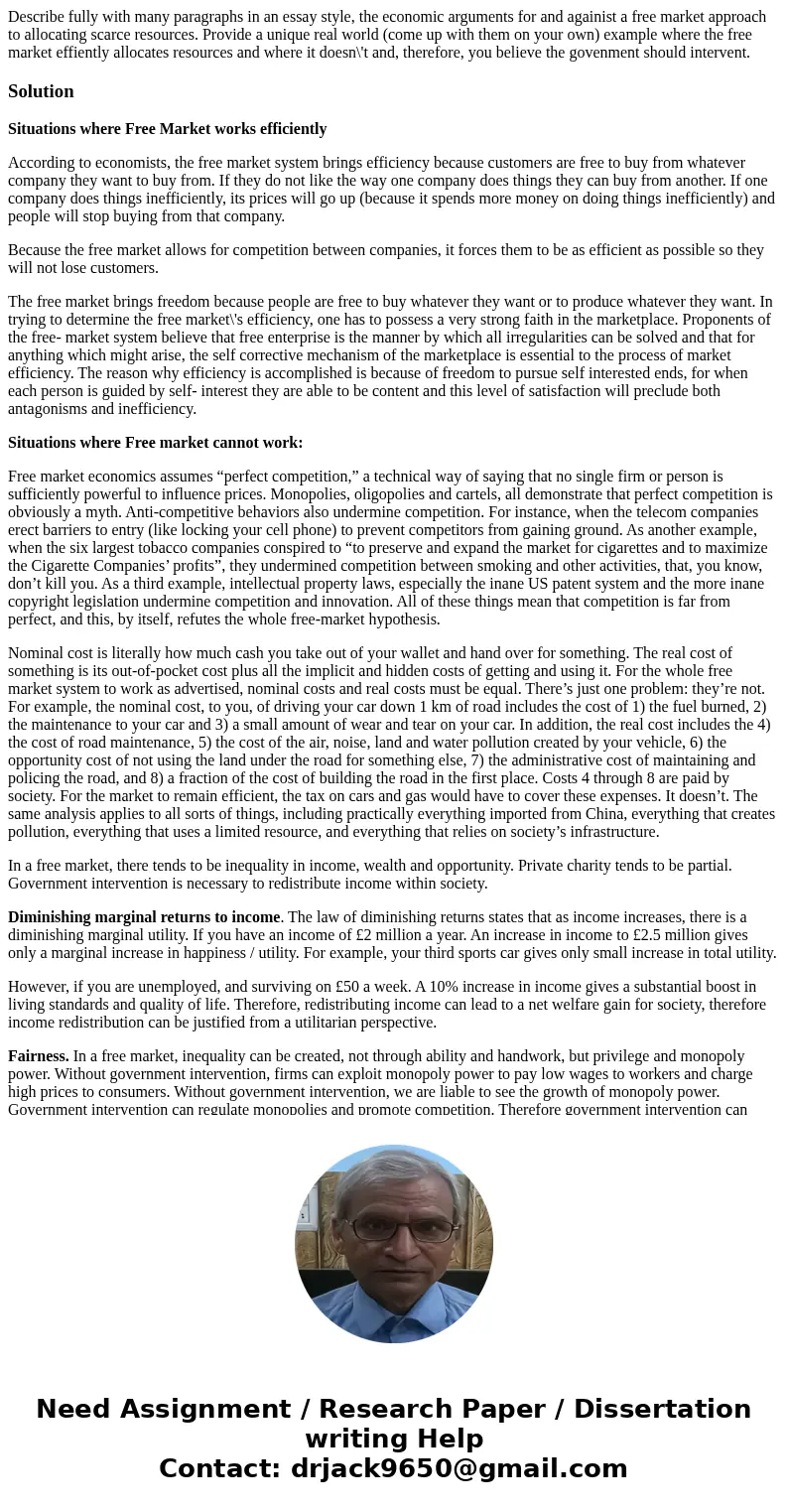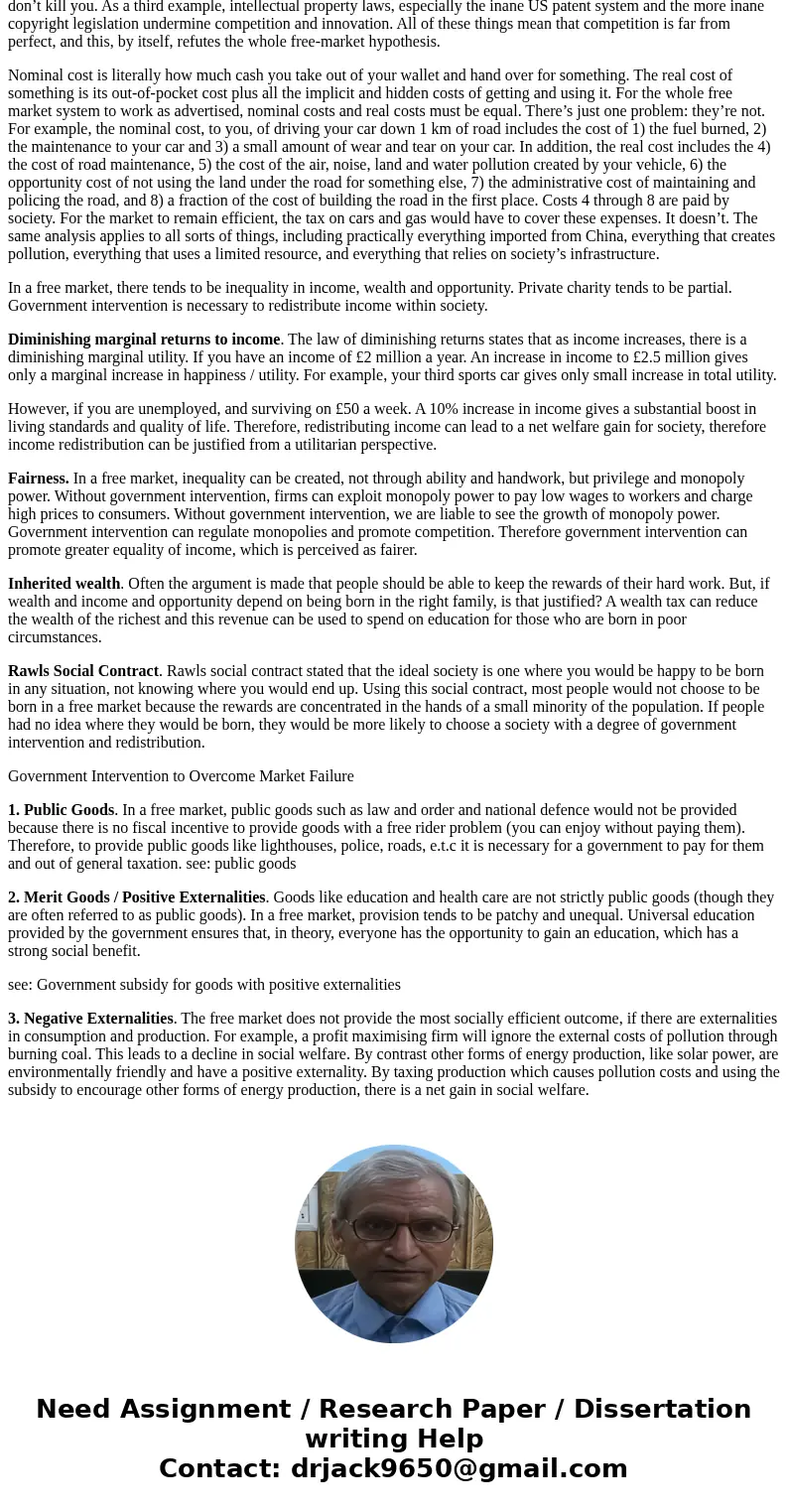Describe fully with many paragraphs in an essay style the ec
Describe fully with many paragraphs in an essay style, the economic arguments for and againist a free market approach to allocating scarce resources. Provide a unique real world (come up with them on your own) example where the free market effiently allocates resources and where it doesn\'t and, therefore, you believe the govenment should intervent.
Solution
Situations where Free Market works efficiently
According to economists, the free market system brings efficiency because customers are free to buy from whatever company they want to buy from. If they do not like the way one company does things they can buy from another. If one company does things inefficiently, its prices will go up (because it spends more money on doing things inefficiently) and people will stop buying from that company.
Because the free market allows for competition between companies, it forces them to be as efficient as possible so they will not lose customers.
The free market brings freedom because people are free to buy whatever they want or to produce whatever they want. In trying to determine the free market\'s efficiency, one has to possess a very strong faith in the marketplace. Proponents of the free- market system believe that free enterprise is the manner by which all irregularities can be solved and that for anything which might arise, the self corrective mechanism of the marketplace is essential to the process of market efficiency. The reason why efficiency is accomplished is because of freedom to pursue self interested ends, for when each person is guided by self- interest they are able to be content and this level of satisfaction will preclude both antagonisms and inefficiency.
Situations where Free market cannot work:
Free market economics assumes “perfect competition,” a technical way of saying that no single firm or person is sufficiently powerful to influence prices. Monopolies, oligopolies and cartels, all demonstrate that perfect competition is obviously a myth. Anti-competitive behaviors also undermine competition. For instance, when the telecom companies erect barriers to entry (like locking your cell phone) to prevent competitors from gaining ground. As another example, when the six largest tobacco companies conspired to “to preserve and expand the market for cigarettes and to maximize the Cigarette Companies’ profits”, they undermined competition between smoking and other activities, that, you know, don’t kill you. As a third example, intellectual property laws, especially the inane US patent system and the more inane copyright legislation undermine competition and innovation. All of these things mean that competition is far from perfect, and this, by itself, refutes the whole free-market hypothesis.
Nominal cost is literally how much cash you take out of your wallet and hand over for something. The real cost of something is its out-of-pocket cost plus all the implicit and hidden costs of getting and using it. For the whole free market system to work as advertised, nominal costs and real costs must be equal. There’s just one problem: they’re not. For example, the nominal cost, to you, of driving your car down 1 km of road includes the cost of 1) the fuel burned, 2) the maintenance to your car and 3) a small amount of wear and tear on your car. In addition, the real cost includes the 4) the cost of road maintenance, 5) the cost of the air, noise, land and water pollution created by your vehicle, 6) the opportunity cost of not using the land under the road for something else, 7) the administrative cost of maintaining and policing the road, and 8) a fraction of the cost of building the road in the first place. Costs 4 through 8 are paid by society. For the market to remain efficient, the tax on cars and gas would have to cover these expenses. It doesn’t. The same analysis applies to all sorts of things, including practically everything imported from China, everything that creates pollution, everything that uses a limited resource, and everything that relies on society’s infrastructure.
In a free market, there tends to be inequality in income, wealth and opportunity. Private charity tends to be partial. Government intervention is necessary to redistribute income within society.
Diminishing marginal returns to income. The law of diminishing returns states that as income increases, there is a diminishing marginal utility. If you have an income of £2 million a year. An increase in income to £2.5 million gives only a marginal increase in happiness / utility. For example, your third sports car gives only small increase in total utility.
However, if you are unemployed, and surviving on £50 a week. A 10% increase in income gives a substantial boost in living standards and quality of life. Therefore, redistributing income can lead to a net welfare gain for society, therefore income redistribution can be justified from a utilitarian perspective.
Fairness. In a free market, inequality can be created, not through ability and handwork, but privilege and monopoly power. Without government intervention, firms can exploit monopoly power to pay low wages to workers and charge high prices to consumers. Without government intervention, we are liable to see the growth of monopoly power. Government intervention can regulate monopolies and promote competition. Therefore government intervention can promote greater equality of income, which is perceived as fairer.
Inherited wealth. Often the argument is made that people should be able to keep the rewards of their hard work. But, if wealth and income and opportunity depend on being born in the right family, is that justified? A wealth tax can reduce the wealth of the richest and this revenue can be used to spend on education for those who are born in poor circumstances.
Rawls Social Contract. Rawls social contract stated that the ideal society is one where you would be happy to be born in any situation, not knowing where you would end up. Using this social contract, most people would not choose to be born in a free market because the rewards are concentrated in the hands of a small minority of the population. If people had no idea where they would be born, they would be more likely to choose a society with a degree of government intervention and redistribution.
Government Intervention to Overcome Market Failure
1. Public Goods. In a free market, public goods such as law and order and national defence would not be provided because there is no fiscal incentive to provide goods with a free rider problem (you can enjoy without paying them). Therefore, to provide public goods like lighthouses, police, roads, e.t.c it is necessary for a government to pay for them and out of general taxation. see: public goods
2. Merit Goods / Positive Externalities. Goods like education and health care are not strictly public goods (though they are often referred to as public goods). In a free market, provision tends to be patchy and unequal. Universal education provided by the government ensures that, in theory, everyone has the opportunity to gain an education, which has a strong social benefit.
see: Government subsidy for goods with positive externalities
3. Negative Externalities. The free market does not provide the most socially efficient outcome, if there are externalities in consumption and production. For example, a profit maximising firm will ignore the external costs of pollution through burning coal. This leads to a decline in social welfare. By contrast other forms of energy production, like solar power, are environmentally friendly and have a positive externality. By taxing production which causes pollution costs and using the subsidy to encourage other forms of energy production, there is a net gain in social welfare.


 Homework Sourse
Homework Sourse